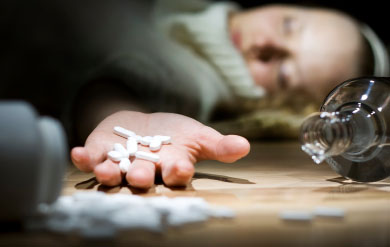What is an Overdose?
At least half of opioid overdose deaths in the U.S. involve prescription opioids.
Why should I be concerned about overdose?
- Prescription opioids can cause overdose
- Your breathing may slow or even stop completely
- Mixing opioids with alcohol or sedatives increases your danger for overdose.

Signs that someone is having an overdose
If a person has any of these signs and can't respond to you, they are having an overdose. An overdose usually happens 1 to 3 hours after a person has used.
- Heavy nodding
- No response when you yell person's name or rub the middle of the chest hard
- Blue lips or fingertips
- Slow breathing (less than 1 breath every 5 seconds) or no breathing
- Very limp body and very pale face
- Choking sounds or a gurgling, snoring noise
Sources:
"Injury Prevention & Control: Opioid Overdose.” Centers for Disease Control and Prevention, 2016.
“Massachusetts Provisional Deaths 2011” Massachusetts Department of Public Health Bureau of Health Information, Statistics, Research, and Evaluation and the Bureau of Substance Abuse Services, 2013.
Overdose Prevention Instructions courtesy of
Prescribe to Prevent
